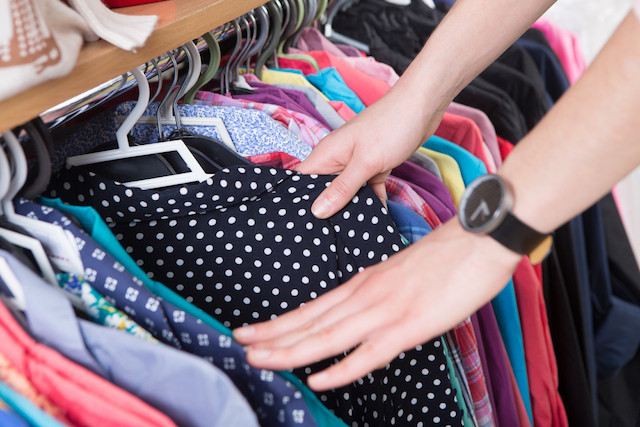Last year I set myself the challenge of not buying any new clothes and I figured I’d need everything I had. I didn’t last long. When the January sales began, I put back the start date to February. It’s now been a full year of trying, I stress trying because I slipped up several times: I added three pairs of new shoes and some tights to my already ample wardrobe. Those aside, I resisted buying any other new clothes.
I started this challenge because of the disastrous impact of fast fashion on people and the environment. We've become like the Emperor in the Hans Christian Andersen story “The emperor’s new clothes”, with a coat for every hour of the day. I thought I was one of the not-so bad-ones until I realised I was buying stuff that I didn’t even wear. The too-long palazzo pants, the shoes that were too small, the top I never had the courage to wear. I needed to reset my consumption habits and I thought the best way to do that was to stop buying more stuff and consider what I already had.
Instead of shopping in my free time, I had shoes repaired, I washed that pile of hand-wash only clothing that had been sitting in the laundry bin for a year, and I repaired tatty seams. What happened surprised me: I found I had more time and money to do other things, like (try to) make my own clothes (it gave me a new respect for the people who make clothes) or do something relaxing. I also took greater pride in what I wore. When I did need something, I turned to second-hand stores and gave a home to cast-offs from friends.
Growing up in the UK, I’ve always been a regular at the local charity shops. But, as our collective conscience is waking up to the environmental and human rights liability that is the fast fashion industry, I’m beginning to see a flaw in this strategy. Fast fashion relies on cheap clothing which people happily hand-over to charity shops once they tire of it. Charity shops are, to a certain extent then, enabling this throw-away culture.
What’s the solution?
There are scores of ethical clothing brands made from sustainable materials online, even a few shops and brands in Luxembourg (Moda, Akabo, Impashion, What Eve Wears, Natural Vibes). But, this opens up two new issues: define “sustainable” and how the average consumer can afford it? Organic cotton still uses enormous amounts of water in its production, for instance. On the latter point, ethical clothing is more expensive because the consumer pays the real price of production (ie a fair price to all those involved in the supply chain). Certainly, the rich have a responsibility to consume in a more sustainable manner, but it shouldn’t become a privilege of the rich. We need to make responsible fashion accessible for all.
Last week, UK MPs proposed a 1 pence per garment tax and darning classes in schools to cut clothing waste. A report found the fashion business generated a million tonnes of waste each year and the tax aims to fund better clothing collection and recycling. In my view, it’s a step in the right direction but why stop there? Shifting the responsibility back to producers in a polluter pays principle can make a big difference when it’s more inconvenient or costly to pollute than not. But enforcing such regulations and controlling the supply chain of these brands will require greater investment for it to be effective.
Storytelling for grassroots change
As consumers, we should all be rethinking what we buy, how much we buy and accept to pay more for better quality. There have been a few blogs and videos of young people trying to live with less, but the difficulty comes with sustaining this lifestyle. That's where I am now. I am not a saint--my one-year shopping-free trial is over and I could very easily slip back into my old habits.
One of the most effective awareness-raising tools I’ve seen in recent years has been David Attenborough’s “Blue Planet II” TV series, examining the impact of human activity on marine life. Within a short time of it being aired, youngsters were telling their parents not to buy them juice cartons with straws because they hurt the turtles. The lesson here is that parents are much more likely to listen to their kids than they will to an MP. If we’d seen tuna tangled in a pair of tights, or a family struggling with life-threatening health issues because of the pesticides used on the cotton crops they farm, we might change. We need a “Blue Planet” on fast fashion that kids will be able to relate to. Or better yet, a movie version of the Hans Christian Andersen story, which spells out how we are all becoming like the emperor and swallowing all the hype that goes with fast fashion.
In a rich country like Luxembourg, we’re seeing people make more informed choices about food and packaging. Luxembourg’s government even recently announced that it wants a fifth of all of its produce to be organic by 2025. It has taken many years for Fairtrade and organic foods to gain a foothold. Luxembourg’s collective conscience is slowly waking up to fast fashion’s damage. “Rethink Your Clothes” is one of the biggest drivers for change in this area. Its fashion days from 5-7 April provides a good starting point for anyone looking to shift their fashion consumption habits.
